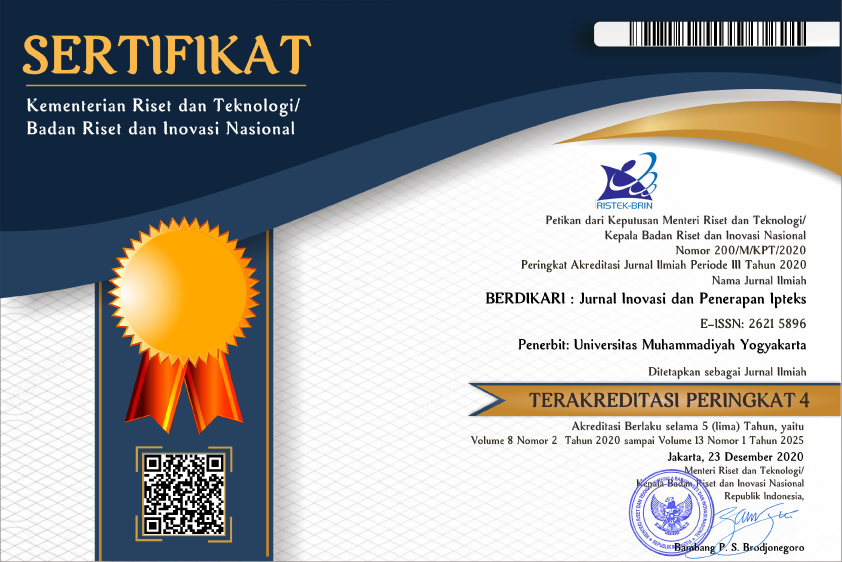Peningkatan Tata Kelola dan Promosi Aneka Snack untuk Memperluas Pangsa Pasar Mancanegara
DOI:
https://doi.org/10.18196/bdr.5115Abstract
Nowdays, snack products have new creations with started to be widely available. However, it is produced by micro, small and medium enterprises (UMKM), of course also experience constraints as MSME in general is not profes-sional yet did by the people and can not produce continuously. It is a small business, the production aspect of UMKM also uses simple methods and technology and still uses simple management as well. SMEs that move in the fulfillment of culinary tourism also has constraints and has characteristics sebagaiman above. Culinary business that seeks to support tourism include eel products/fried catfish crispy and seaweed. Both of these efforts are done by young people who are creative and have a willingness to go forward developing the business. For catfish fried crispy is done by Noviani brass with trademark “Sari Rasa” while for various snack that comes from seaweed developed by Br. Stenley Avanda with brand “Panda”. Once identified through observation and interviews it can be seen that the problems that are still faced include: 1) not understood yet how to market products to foreign tourists, 2) not to implementation yet of professional governance and administration, including the absence of a good business plan, and regular organizational systems; 3) unavailability of English-speaking product packaging; 4) lack of promotion media using the internet; 5) the need for more intensive management assistance to penetrate the wider market. From these problems, efforts have been made to overcome them through activities such as the understanding of export management or foreign tourism through applicative training, product promotion by using English packaging, making brochures with english language and making english-language website. From a series of activities, both partners benefit from increased understanding of product sales to foreign tourists, and can take advantage of promotional media in accordance with the needs of foreign tourists.
Keywords: Governance, promotion, various snacks.
References
Anandya, Dudi, 2005, Riset Pemasaran, Prospektif dan Terapan, Yogyakart: Bayumedia.
Pitana, I Gde dan I Ketut Surya Diarta, 2009, Pengantar Ilmu Pariwisata, Yogyakarta: Penerbit Andi.
Sunaryo, Bambang, 2013, Kebijakan Pembangunan
Destinasi Pariwisata, Konsep dan Aplikasinya di
Indonesia, Yogyakarta: Gava Media.
Susanta, Gatut dan M. Azrin Syamsudin, 2009, Cara Mudah Mendirikan dan Mengelola UMKM, Jakarta: Raih Asa Sukses.
Tjiptono, Fandy, 2008, Total Quality Service, Yogyakarta: Penerbit Andi.
Downloads
Published
Issue
Section
License
Copyright
Authors retain copyright and grant BERDIKARI Jurnal Inovasi dan Penerapan IPTEK the right of first publication with the work simultaneously licensed under an Attribution 4.0 International (CC BY 4.0) that allows others to remix, adapt and build upon the work with an acknowledgment of the work's authorship and of the initial publication in BERDIKARI Jurnal Inovasi dan Penerapan IPTEK.
Authors are permitted to copy and redistribute the journal's published version of the work (e.g., post it to an institutional repository or publish it in a book), with an acknowledgment of its initial publication in BERDIKARI Jurnal Inovasi dan Penerapan IPTEK
License
Articles published in the BERDIKARI Jurnal Inovasi dan Penerapan IPTEK) are licensed under an Attribution 4.0 International (CC BY 4.0) license. You are free to:
- Share — copy and redistribute the material in any medium or format.
- Adapt — remix, transform, and build upon the material for any purpose, even commercially.
This license is acceptable for Free Cultural Works. The licensor cannot revoke these freedoms as long as you follow the license terms. Under the following terms:
- Attribution — You must give appropriate credit, provide a link to the license, and indicate if changes were made. You may do so in any reasonable manner, but not in any way that suggests the licensor endorses you or your use.
- No additional restrictions — You may not apply legal terms or technological measures that legally restrict others from doing anything the license permits.




